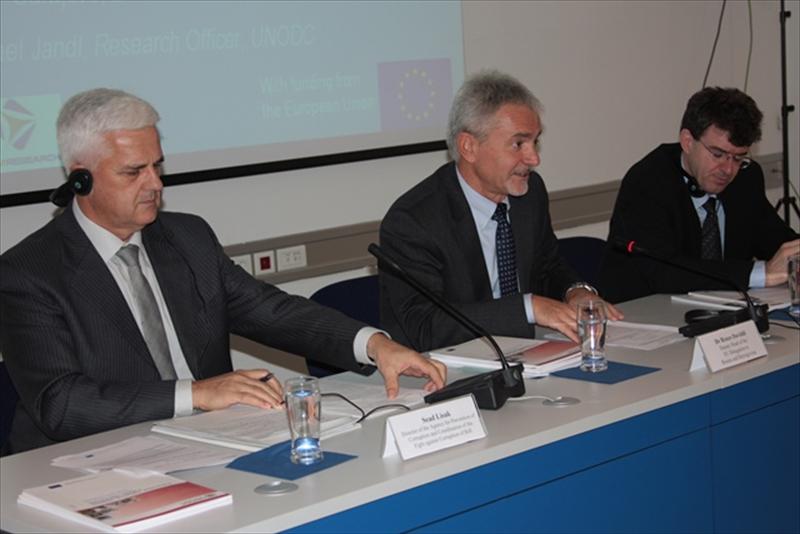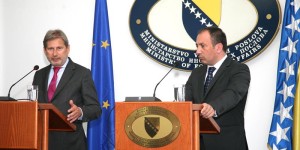Dear ladies and gentlemen,
Let me start with congratulating the UN Office for Drugs and Crime (UNODC) for launching with this report a more than overdue discussion: on the impact of corruption in Bosnia and Herzegovina as on economic activities.
As you know, the EU recognises corruption to be a serious challenge and an obstacle to democratic and economic development of a country. We think it is high time that BiH equally recognises the extent to which corruption harms the functioning of institutions and economy and makes the fight against corruption one of its utmost priorities at all levels of government. Reading this survey is an alarming eye opener and confirms the scope of the challenge we are facing.
Let me pick up some out of the many valuable findings of this report and let’s reflect what can be done to improve the situation:
The first finding is that corruption is a phenomenon which is deeply rooted in day to day business in this country. Business representatives in Bosnia and Herzegovina rank corruption as the sixth most significant obstacle to doing business in this country. One out of 10 contacts between business and public officials include a bribe.
As the report shows, the impact of different corruption practices on the private sector is considerable – it comes at a high cost for companies, impedes economic growth, distorts competition and represents serious legal and reputational risks.
Furthermore, it deteriorates the business climate and decreases the interest of foreign investment. In the World Bank “Ease of doing business index”, which reflects whether the regulatory environment is conducive to the starting and operation of a local firm, Bosnia and Herzegovina ranks 131 out of 189 countries. This calls for action.
There is a lot that can and must be done to address corruption risks in the relations between public and private sector:
The report shows, that regulation is one of the key areas where many opportunities for corruption arise. The more procedures required, the greater the opportunities for acts of corruption. Less and shorter procedures can be one of the ways to prevent corruption. Such preventive measures are in the common interest of public authorities and the private sector and can be put in place swiftly.
Proper regulation of public procurement is another important measure to take. There are over 2000 public procurement authorities who, on a daily basis, interact with the private sector to provide services, supplies and works to the citizens of BiH. It is absolutely crucial for the transparency and effectiveness of spending this taxpayer’s money, and getting the best for it, that the proper procurement procedures are in place. We are therefore strongly encouraging the Parliament to adopt as soon as possible a Public Procurement Law in line with the EU standards. The Law which is currently in force does not meet such standards and it is not in line with the EU aquis.
The report also shows that public officials at lower administrative levels and in tax and customs administrations are particularly vulnerable to corruption. We therefore need to get the fight against corruption to all levels of government and target it to the most vulnerable sectors such as Building and Construction, Wholesale and Retail trade.
The second finding in the report, which I find highly alarming, is the lack of trust of business representatives in the judicial follow up of corruption crimes. Nearly half (44 per cent) of the bribery acts are not reported because business representatives consider that it would be “pointless to report them as nobody would care”.
A credible criminal policy and a convincing criminal justice process are needed to get out of this downward spiral of lack of certainty and buying it through corruption. Judiciaries and law enforcement agencies – free from political interference and capable of effectively investigating and prosecuting corruption – are a must. Corruption needs to get a price tag that makes it too expensive from a cost-benefit point of view.
This requires political will: moving against corruption requires not only business officials and judiciary to take their responsibility, but also political will.
Being on the eve of an election year, there is a unique opportunity to ensure that the fight against corruption is high on the political agenda.
Business representatives may work toward promoting integrity in business practices within their own ranks, by stimulating ethical conduct, signing integrity pacts and declining to do business with unethical businessmen.
Civil society and business associations may push for developing policies that promote transparency in the public-private interface.
Public sector management may publicly commit to the fight against corruption and implement integrity measures in their respective institutions.
Politicians and policy makers may commit to cleaning up the institutions in Bosnia and Herzegovina and instilling a climate of integrity.
The EU has put the fight against corruption high on its agenda by making it a benchmark in the post visa liberalisation monitoring mechanism. The fight against corruption is supported via the EU financial assistance – IPA.
From experience with other accession countries, the EU has recognised that in negotiating accession, chapters dealing with the rule of law (23 and 24) are the most difficult for accession countries, whereof the European Commission has adopted a new approach for these chapters. The new approach means years of negotiations and it’s not only about adoption of strategies and laws, the countries also need to demonstrate a good track record. These chapters are from now on opened first and most likely closed last.
The European Commission’s Progress Report, which was launched a month ago identified that Bosnia and Herzegovina has an insufficient track record of investigation and prosecution in corruption cases. Even though the number of reports filed has increased by 48 % from 2011 to 2012, the number of indictments confirmed is still modest and the number of final verdicts issued remains low. The report concludes that Bosnia and Herzegovina is at an early stage in the fight against corruption.
Of course fighting corruption is not a process that would be completed overnight. It is a process that will require strong political will and political courage and so far we have not seen sufficient determination to tackle corruption.
Whoever picks the fight against corruption as his or hers could rely on the assistance of the EU to turn declarative statements into concrete deliverables.
Thank you.




